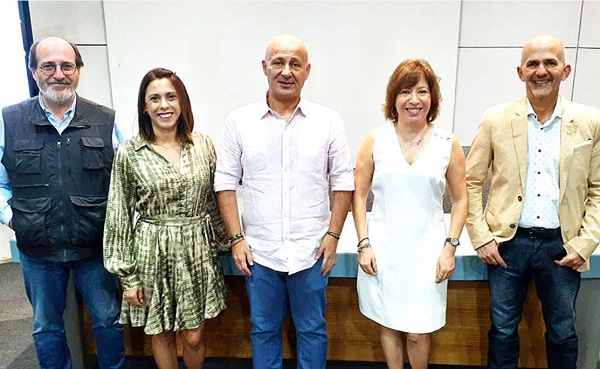In order to discuss and analyze topics related to progress in studies of the group of proteins and other molecules secreted (secreted) by a particular cell, tissue or organ, specialists from veterinary sciences, both nationally and internationally, gathered within the framework of the Conference on the Influence of Glycoscience in Veterinary Sciences held in Chillan Campus of the University of Concepción.
On this occasion, one of the academic activity coordinators and researcher Dr. Fidel Ovidio Castro stressed the importance of this topic. “Modern science has been moving towards using what cells produce and not cells as such. For example, when a woman gets pregnant, the fetus secretes substances that stimulate the uterus so that the embryo implants, but the uterus also secretes substances so that the embryo implants, so there is a connection and until recently this was The communication is based on what we know as proteins and hormones, but today we see that there are other signals that mediate this communication, namely extracellular vesicles, which have to do with everything, like the regenerative therapies that we do.”
The event, organized by the UdeC Animal Biotechnology Group, lasted for two days, and took advantage of the unique opportunity of being able to draw on leading scientists, to officially start the 2023 Graduate School Year of the Faculty of Veterinary Sciences, achieved with the inaugural conference: “Extracellular Vesicles: New Paradigms in Communication Between cells was provided by Dr. Demetrius Rizos, of the National Institute of Agricultural, Food and Technology Research in Madrid, Spain.
“We are looking at extracellular vesicles that can exit from a healthy cell and can be taken from another recipient cell. We want to see what effect those cells that leave the mother, for example, and that enter the fetus or vice versa, analyze the connection that exists between the fetus and the mother to achieve A successful pregnancy at the end of pregnancy and improving everything, mimicking those conditions in laboratory forms.”
international event
The activity was carried out in person and remotely, allowing people from Colombia, Ecuador and Argentina to attend. Also attended as specialists and speakers d. Luis Luceno of the National University of Rio Cuarto, Argentina. and Dr. Graça Ferreira, of the Faculty of Veterinary Medicine, University of Lisbon, Portugal, who gave their presentation in the closing frame of the Fondef IT 19110007 project, “Clinical validation in horses of a prototype cell-based regeneration treatment of maternal allogeneic stromal and immunogenicity.”
Dr. indicated. “I was focused on communicating the results of the research to the user, let’s say the user, which is the vet, and the target, which is the patient, who is female. So, I was a little bit in the middle, conveying or at least suggesting my vision of what is going on in the research and why it is being done and how it can be conveyed to clinical and production environments,” define the expert.
For her part, Dr. Ferreira tackled the issue of infertility in mares and the search for treatments for endometriosis in mare, where she explained that “endometriosis is a degenerative process of the uterus and is responsible for infertility in a large percentage of the elderly. For the same reason, I referred to the attempts we made to find a cure to this disease.”
The event was organized by academics from the Faculty of Veterinary Sciences UdeC, Dr. Fidel Ovidio Castro, Dr. Fernando Saravia and Dr. Lleretny Rodríguez, who presented the progress of the regular Fodencyt projects 1210349 and 1210334 that they lead, with the idea of disseminating and internationalizing the results associated with said projects.
Finally, in the afternoon session on March 8, PhD students connected to Fondecyt’s projects presented the progress of their respective dissertations. In the same way, the progress of Dr. Joel Cabezas-Salazar’s postdoctoral project Fondecyt 3220291, which was carried out under the auspices of Dr. Lleretny Rodríguez and relates to new approaches to the study of the interaction between the fetus and the uterus, in bovine species, but with possible application to humans, was presented.
Text: Francesca Olaf

“Social media evangelist. Student. Reader. Troublemaker. Typical introvert.”

:quality(85)/cloudfront-us-east-1.images.arcpublishing.com/infobae/TEQF6EONZRFGLLLDIDD4L2O4EE.jpg)

:quality(75)/cloudfront-us-east-1.images.arcpublishing.com/elcomercio/XU32LRAEZFDDPNVHLFU3CKVBYY.jpg)



More Stories
Venezuela ranks fourth in female leadership in science and technology in Latin America
In Portuguesa and Sucre they explore the wonderful world of science
The university court overturns the expulsion of two teachers and a chemical sciences student